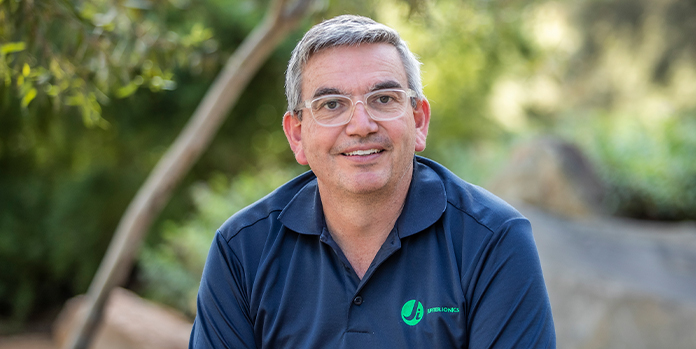Dr Charlie Day (OM 1988) is a Rhodes Scholar, an Oxford PhD graduate, a former CEO of Innovation and Science Australia and, by any measure, a highly successful academic and business leader. And when asked about his remarkable life and career, he’s clear about the direction he has taken.
“I’ve always followed my passions and my interests, which has been in science and the application of science to real-world problems. And over the years, I’ve found myself in fascinating roles, which have been very challenging, but also really rewarding,” Charlie says.
Solving a problem of planetary proportions
Today, Charlie is a board member of ANDHealth – a consortium focused on digital health commercialisation, as well as a mentor and investor with the space industry accelerator program, Moonshot. But his main professional role is CEO of Jupiter Ionics, a company he helped establish to develop technology that makes production of human-made ammonia far more sustainable than it’s ever been before.
“Ammonia is the key ingredient in fertiliser. Without synthetic ammonia, it’s estimated about half of the world’s population would not have food.”
“But the challenge is that the current production process used to make ammonia relies heavily on fossil fuel as a key feedstock. Plus, the process generates about two tonnes of carbon dioxide for every tonne of ammonia. As we think about a net-zero future for the world, if we want to continue to maintain food security for the world’s food supply, we need to find an economic way to make ammonia that draws less on fossil fuels and doesn’t generate any carbon emissions. That is the technology that Jupiter Ionics is developing.”
“There are other great applications for this green ammonia as well. It can be used as a fuel in place of fossil fuels and also operate as a ‘store’ for renewable energy allowing it to be transported over long distances.”
This climate-technology focused role has allowed Charlie to combine his technical background in chemical engineering with his passion for innovation and entrepreneurship. “Our Chief Scientist, Professor Doug MacFarlane, who is an academic at Monash University, really drives the technology side of things. I focus very much on the commercial and business side of things.
“But in a small company like ours, at an early stage, the dividing line between business and science is pretty thin. So, we both work very closely on pretty much all aspects.”
The best entrepreneurs are great collaborators
Often, the stereotype of the successful entrepreneur in popular culture and media is a singular, sometimes even a superheroic character. This genius tends to stand above all others, sometimes battling against the mediocrity or short-sightedness of colleagues. Charlie presents a distinctly different picture.
“The most important advice I would give to any budding entrepreneur is to recognise that innovation is a team sport. And if you’re trying to build a new business or you’re developing new technology, your first step should be trying to find the people you need around you to help you do that.”
In an earlier role as Program Director at the Carlton Connect Initiative, Charlie was instrumental in establishing mechanisms to support emerging entrepreneurs across Australia. It is something he continues to champion to this day. “I’ve always had the philosophy that, if I can bring people together and help other entrepreneurs to accelerate their activities and scale their businesses, then that’s a good thing. So even though running Jupiter is very much a full-time role for me, I do make some time to be involved in a couple of other tech communities, where I’m trying to give back.”
“Beyond that collaborative approach, I always encourage people who are interested in this space to play to their strengths, play to their passions. Because if you do that, I think you’ll enjoy what you do. You’ll do good-quality work. And that will lead you to interesting places.
The importance of recognition
Charlie was a high achiever from an early age, and graduated from Melbourne Grammar School as the Proxime Accessit (Dux runner-up), and with the Marian Flack Scholarship, an award that recognises scholarly excellence.
“There’s an element of the environment and the culture at Melbourne Grammar that does support people to strive for excellence. I think that scholarships, like the Marian Flack Scholarship, provide a tangible mark or a reflection of academic excellence. I think it’s really important to have recognition for people who work hard in the academic realm and achieve those high results.”
“I think merit-based scholarships of this type, along with the range of prizes and awards given to high achieving students at the School, have a place alongside needs-based scholarships – scholarships that enable people to attend the School or do other things that they wouldn’t otherwise be able to do. They are also super important.”
“I was fortunate enough to have a very broad experience at school. Not just what I did in the classroom, but in music and sport and other things like that. And I think that it has probably left me with a sense that you have to bring your whole person to everything that you do.
“A lot of the lessons around leadership I learned on the river. A lot of the lessons around teamwork were in the music room and in LGR [Leslie Gladstone Robertson Society] activities. I think the lesson that has stood me in good stead is that, to be an effective leader, you have to bring a multifaceted self to the task and to the challenge.”
About the Marian Flack Scholarship
Charlie Day was the 1988 recipient of the Marian Flack Scholarship.
The Scholarship was established by Joseph Henry Flack in memory of his daughter Marian in 1910.
Named for her mother, Marian was the younger sister of Edwin Flack (OM 1890) – Australia’s first Olympian of the modern era and (Henry) Reginald Flack (OM 1893). Her history is not well documented, but it is known that she died in 1903 aged just 25.
The Scholarship is awarded upon graduation from the School and was intended to be given to a student leaving for university. Over the years, it has been typically given to very high achieving students, often the Academic Head of School (Dux) or the Proxime Accessit (Dux runner-up).
You can read more about the generosity of the Flack family here.



